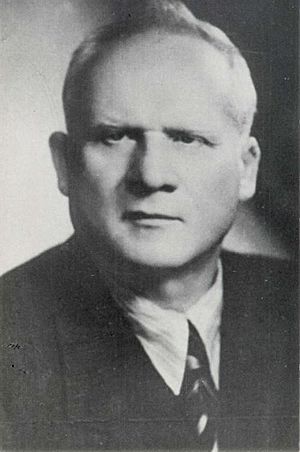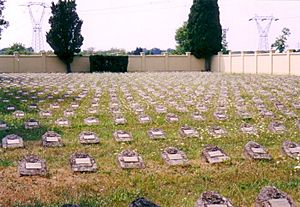Prežihov Voranc facts for kids
Quick facts for kids
Prežihov Voranc
|
|
|---|---|
 |
|
| Born | Lovro Kuhar 10 August 1893 Podgora, Duchy of Carinthia, Austria-Hungary |
| Died | 18 February 1950 (aged 56) Maribor, Yugoslavia, |
| Pen name | Prežihov Voranc |
| Occupation | Novelist, short story writer |
| Nationality | Slovenian |
| Citizenship | various |
| Subject | Social realism |
| Notable works | Samorastniki (1940), Doberdob (1939), Jamnica (1940) |
Prežihov Voranc (born Lovro Kuhar) was an important Slovenian writer. He lived from 1893 to 1950. He was also a political activist with strong socialist beliefs. Voranc became famous in the 1930s for his novels and short stories. His stories often showed the struggles of poor people in Slovenian villages and factories. Some of his most famous books are Požganica (1939) and Doberdob (1940).
Contents
Biography
Early Life and Education
Prežihov Voranc was born Lovro Kuhar on August 10, 1893. His birthplace was Podgora, a small village near Kotlje in Carinthia. This area was then part of Austria-Hungary. His parents were farmers who worked hard to own their land. His younger brother, Alojzij Kuhar, later became a well-known politician and historian.
Voranc's pen name, Prežihov Voranc, comes from his family's farm, called Prežih. "Voranc" is how people in his region said "Lovrenc" or "Lovro." So, his pen name means "Lovro from the Prežih farm."
Life in his mountain home was tough because the land was hard to farm. Voranc often wrote about the hard work and strength needed to survive there. He didn't have much formal schooling, only elementary school and a course in farm management. But he loved to learn and read many books on his own throughout his life.
In 1909, Voranc's first story was published in a Slovenian magazine called Domači Prijatelj. This magazine was run by the writer Zofka Kveder. He wrote many short stories for it, usually about farmers and village people from his home region. From 1911 to 1912, Voranc lived in Trieste. There, he became more interested in politics. He wrote about unemployed people and those who didn't fit in for a newspaper called Zarja.
Experiences in World War I
When World War I began, Voranc was called to join the Austro-Hungarian Army. He fought in battles and was captured in 1916. He spent the rest of the war in prisoner-of-war camps in Italy. Even as a soldier, he kept writing. He often wrote about the feelings of soldiers during wartime, using his own experiences and the lives of the soldiers around him.
Political Activities and Travels
Voranc was released from the camp in 1919. He returned to Carinthia, which was undergoing big political changes. He started working at a steelworks in Guštajn (now Ravne na Koroškem). He became more and more involved in politics and supported Carinthia joining the new country of Yugoslavia.
He continued to write, and in 1925, he published his first collection of short stories, Povesti. Some critics in Ljubljana didn't like it much, calling him just a "talented worker who taught himself to write." However, this book showed the beginnings of his unique writing style.
By 1930, his political activities and socialist ideas led to a threat of arrest. Voranc left Carinthia and moved to Vienna. From there, he traveled to Prague in 1931 and then to Berlin in 1932. This was a busy time for him, as he worked with other socialists across Europe. In the early 1930s, he visited Romania, Bulgaria, Greece, Norway, and France. He edited a magazine called Delo in Vienna from 1932 to 1934. He faced trouble with the Austrian authorities and was imprisoned in 1937. Before World War II, Voranc worked as a librarian in Paris, meeting other political exiles.
Rise to Fame with Sodobnost
In 1933, a new left-wing literary magazine called Sodobnost started in Slovenia. It promoted socialist ideas. Voranc's stories, which focused on social realism, quickly became popular with the magazine's editors. The 1930s were a time of big changes, and people needed writers who could show the real lives of working-class people.
Voranc's contributions to Sodobnost made him famous as a writer when he was in his forties. His first story, Boj na požiralniku, showed his special style. It described real events in Slovenian life within beautiful, natural settings. The characters were as strong as the landscape they lived in, and they spoke in a realistic, local way. The story was about a poor family struggling to survive. Boj na požiralniku was a big hit. Five more stories followed between 1935 and 1939. These were later collected in a book called Samorastniki. All these stories were about the lives of peasants in the Carinthian mountains. This region had rarely been written about in Slovenian literature before.
The characters in his stories spoke in the local dialect. They were strong and resilient against the difficulties of their lives. Even though they could be superstitious or stubborn, Voranc also showed them as loyal, brave, honest, and truly religious.
In 1939, Sodobnost published a collection of Voranc's works called Samorastniki. It included stories like Ljubezen na odoru (Passion Above the Precipice) and Vodnjak (The Self-Sown). When World War II began, Voranc left Paris and quickly returned to Slovenia. He lived in Ljubljana and then Mokronog. He worked on an unfinished novel called Požganica, which he had started while in prison in Vienna. This novel, set at the end of World War I, is one of his most political works.
Later Novels and War Years
His novel Doberdob was published in 1941. It had a difficult journey, with earlier versions of the manuscript being lost. The final version is a collection of stories and thoughts about the lives of Slovenes during World War I. It is a very patriotic novel about the Battle of Doberdò. Because of Voranc's novel, Doberdò became a very important symbol for Slovene people who suffered in World War I.
His third novel, Jamnica, is set in a village in Carinthia between the two World Wars. It shows how traditional village life was changing as industries grew. This novel was not published until 1946.
In April 1941, after Yugoslavia was invaded, northern Slovenia was taken over by Nazi Germany. Ljubljana and Mokronog were occupied by Italian troops. Voranc feared for his safety and left Slovenia again, going to Zagreb in Croatia and then to the Bosnian countryside. However, he decided to return to Ljubljana for the rest of the war. He did not join the armed resistance movement. On September 11, he secretly met with other writers. They decided on a "cultural silence," meaning Slovenian artists would not publish, exhibit, or perform anything during the war as a protest.
Because he was suspected of having socialist sympathies, Voranc was arrested in January 1943. He was sent to the Sachsenhausen concentration camp and Mauthausen-Gusen concentration camp. He returned to Ljubljana at the end of the war, sick and sad. He found it hard to connect with his family and friends. He went back to his home village in Carinthia. There, he stopped his political activities and stayed away from the politics of the new communist Yugoslavia. He worked on Solzice, a historical novel that was not finished when he died in Maribor in 1950.
Main Themes in Voranc's Writings
As a child, Voranc experienced the very hard work of farming on steep mountain slopes. This theme of farmers fighting against the tough land appears often in his writing. The mountains of Carinthia and the working-class people living there were central to his ideas. He showed the beauty of the scenery alongside the shared hard work and friendship among people. Voranc was always drawn to people who were unlucky or treated unfairly.
His experiences during World War I deeply affected him. He explored the psychological impact of war in his novel Doberdob. Voranc wanted to show his readers the true reality of his characters' lives, without being overly emotional. He preferred to write about poor farmers and industrial workers. He set their stories against the backdrop of a land that sometimes seemed to work against them. His socialist beliefs are very important to understanding his later work. In the 1930s, while living away from Slovenia, he learned more about international socialism. He adapted these ideas into his realistic writing style to fit Slovenian culture.
Selected Books (English / German)
- Prežihov Voranc. 1983. The Self-Sown, Bilingual edition of a Slovene classic. New Orleans: Prometej. (English)
- Prežihov Voranc. 1994. Two short stories, "The Self-Sown" and "Passion above the Precipice." Translation and introduction by Irma Marija Ana Ožbalt. Ljubljana: Slovene Writers Association. (English)
- Prežihov Voranc. 2012. Winter in Klagenfurt. Drei Geschichten. Translated by Jozej Strutz. Klagenfurt: Kitab, . (German)
- Vienna, Paris, Saualm. Stories and reports, from the Slovenian by Jozej Strutz, Drava-Verlag, Klagenfurt 2016, . (German)


